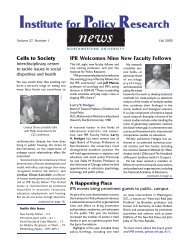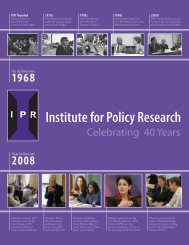pdf - Institute for Policy Research - Northwestern University
pdf - Institute for Policy Research - Northwestern University
pdf - Institute for Policy Research - Northwestern University
You also want an ePaper? Increase the reach of your titles
YUMPU automatically turns print PDFs into web optimized ePapers that Google loves.
P. Reese<br />
P. Reese<br />
Judy Biggert (R-Ill.), was attended by<br />
more than a hundred people—including<br />
policymakers, journalists, academics,<br />
and advocates—interested in the effects<br />
of teachers, preschool, and economic<br />
programs on children’s academic success.<br />
Larry V. Hedges, Board of Trustees<br />
Professor of Statistics and Social <strong>Policy</strong>,<br />
pointed out that teacher quality varies<br />
most in the schools with the poorest<br />
students, so that it matters more which<br />
teacher a child has in poor schools than in<br />
wealthier ones.<br />
Social psychologist Thomas D. Cook,<br />
Joan and Sarepta Harrison Chair in<br />
Ethics and Justice, discussed how pre-<br />
K programs do make a difference <strong>for</strong><br />
children—at least in the short term—but<br />
that more research is needed to determine<br />
which programs, run by the state or by<br />
Head Start, are better and <strong>for</strong> whom.<br />
From his research comparing various<br />
welfare-to-work experiments, economist<br />
Greg Duncan, Edwina S. Tarry Professor<br />
of Education and Social <strong>Policy</strong>, found that<br />
earnings supplement programs tended<br />
to generate more consistent benefits <strong>for</strong><br />
children, especially in Milwaukee’s New<br />
Hope Project. An antipoverty initiative,<br />
New Hope provided a menu of options<br />
including cash supplements and subsidized<br />
healthcare and/or childcare.<br />
8 Quasi-Experimentation Workshops<br />
Spring 2006 marked the debut of a<br />
series of workshops intended to help<br />
educational researchers understand,<br />
design, and conduct better quasiexperiments.<br />
The workshops’ organizers—<br />
IPR Faculty Fellow Thomas D. Cook,<br />
Joan and Sarepta Harrison Chair in Ethics<br />
and Justice, and his colleague William R.<br />
Shadish of the <strong>University</strong> of Cali<strong>for</strong>nia,<br />
Merced—lectured on the theory and<br />
practice of methods such as regressiondiscontinuity<br />
designs and interrupted time<br />
series. Pointing to many examples from<br />
education, Cook and Shadish highlighted<br />
the advantages of using such<br />
practices and discussed the<br />
circumstances under which<br />
they would not work. Three<br />
more workshops will take<br />
place in 2007. The Spencer<br />
Foundation funds them.<br />
8 Summer Biomarker<br />
<strong>Institute</strong><br />
At a three-day summer<br />
Thomas Cook speaks with Spencer<br />
institute held in June 2006,<br />
Foundation President Michael<br />
participants were educated in McPherson during a workshop.<br />
state-of-the-art methods <strong>for</strong><br />
integrating biomarkers into populationbased<br />
social science research. Organized<br />
by biomarker experts Thomas McDade,<br />
associate professor of anthropology<br />
and associate director of C2S; Emma<br />
Adam, assistant professor of human<br />
development and social policy; and<br />
Christopher Kuzawa, assistant professor<br />
of anthropology, the institute also hopes<br />
to build a community of scholars around<br />
these field-friendly measures of health.<br />
8 NIH Deputy Director<br />
Gives Lectures<br />
Deputy director at the National<br />
<strong>Institute</strong>s of Health (NIH)<br />
Raynard Kington, MD, MBA,<br />
PhD, gave two talks on October<br />
30. In the first, he spoke about<br />
his research on the health<br />
of black immigrants to the<br />
United States. Recent black<br />
immigrants to the United<br />
States report health as good as<br />
that of native-born whites and<br />
better than native-born blacks.<br />
But their health declines over<br />
time, exacerbated by lower<br />
rates of health insurance, changing diets,<br />
or American culture, he said. In the<br />
second talk, Kington addressed some of<br />
the pressing challenges and issues facing<br />
the NIH, including an unprecedented<br />
Raynard Kington<br />
www.northwestern.edu/ipr
















